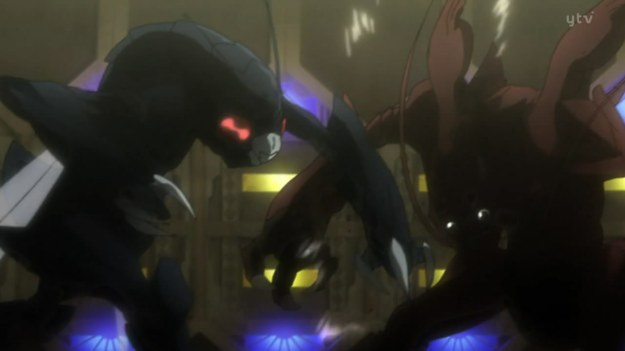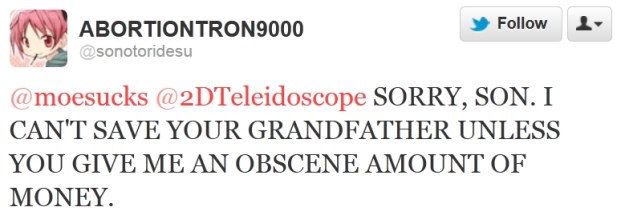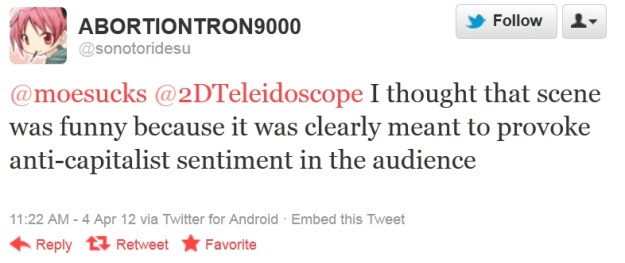In some alternate universe, twisted scientists create vicious killing machines known as Players. These Players are then forced to fight one another in underground gladiatorial style matches for the sick amusement of a few rich people. Or maybe it’s a lot of people–I don’t think the first episode really specifies. I can’t imagine every single rich person in Zetman‘s society being evil, but it’s hard not to notice a particular ideological slant in how the anime chooses to present itself.
Right off the bat, it’s clear that Zetman is trying to focus specifically on the plight of the downtrodden and the disenfranchised–the homeless, the prostitutes, children, i.e. anyone on the lower end of society’s totem pole. We are bombarded with examples of how powerless the people in these groups are. Jin can’t get any medical treatment for his grandpa because he lacks money. Jin’s friends, Kouga and Konoha, are powerless to help him because they are just children under their father’s cruel hand. Twice in the first episode, Akemi is victimized and becomes the damsel in distress just for being the sole woman (I consider Konoha a child) with any significant role in the plot. It’s just obvious what Zetman is trying to accomplish, which is why I think the few missteps in the episode seem all the more glaring.
When we first see the Players, they look like generic monsters that anyone could have come up with: bugmen, big and scary wolves, so on and so forth. But even if the anime’s creators had been a little more creative in designing the Players, I think the Players’ general depiction as monsters was a mistake. It’s obvious that the Players are supposed to represent yet another exploited demographic within the world of Zetman; it’s obvious that they have the same beef with the rich and elite as the groups mentioned above. Making the Players appear as generic monsters thus diminishes their effectiveness as a metaphor.
Now, sure, bugmen with souls or sentience (the copy I have uses the word “sapience,” which is an odd choice in my opinion) deserve fair treatments too, but then why does Jin get to look like a cute, little boy or, when he transforms into Zetman, a stereotypical superhero? Obviously, Jin gets to look like one of us because we’re supposed to root for him. But aren’t we supposed to root for the Players too? Aren’t they just as exploited and cruelly treated as Jin? The fact that there’s such a stark difference between the Players and Jin kind of undermines the message that the anime is trying to convey. There’s just something a little hypocritical about trotting out the homeless, destitute women, and powerless children to advance your case against the 1% when the “killing machines” are being held at arm’s length: “Whoa, whoa, don’t feel too sorry for them. They’re still killers, y’know.”
The rest of the anime isn’t too objectionable; it’s just a little ham-fisted. I don’t mind so much that the villains are pretty much one-dimensional. Stories like Zetman‘s have always been about the black-and-white struggles between good and evil. I also don’t really mind the fact that the way to overcome money and status is apparently physical strength: just beat your villains into submission. After all, none of us really want to see Wolverine going door-to-door to gather signatures for a law against mutant discrimination. My minor gripes with Zetman really just boils down to the fact that I think it tries too hard at times to beat the audience over the head with its obvious message. Someone on Twitter astutely makes note of one of the show’s inconsistencies:
It’s as if the first doctor is included only to show how heartless and greedy people can be, but the execution is so silly that it ends up eliciting laughter rather than sympathy. But for me, personally, the scene that really takes the cake is where Kouga’s father smashes the his son’s cellphone and the debris falls through the frame in slow-motion. Talk about over-the-top. To make things worse, we have Kouga’s wide eyes and gaping maw in quivering in the background as sad violins croon. The whole scene, its setup and conclusion, is just amateurish. I get it–rich people are evil. I’d like to think I’m pretty leftish, but I can’t help but roll my eyes at Zetman‘s cornball attempts to get my teeth gnashing at the 1%.
There are a lot of other things in the first episode that you’d think I’d rail against, but you’d be wrong. I don’t normally like kids in anime, but for a show about the disenfranchised, Jin and his buddies make sense. I’d normally raise an eyebrow at a hot anime babe climbing into a tub witha little boy, but I thought the scene between Jin and Akemi was effective in representing two wayward souls’ dire need for family. I can also overlook the silly fact that the Angel’s Ring in Jin’s hand really looks like a rolled-up condom instead of some mysterious MacGuffin…. Anyway, I just think Zetman needs a few tweaks here and there and it would be decent, even if I don’t particularly care about the shounen-y fighting premise that underlies the show’s plot.
Since the show isn’t brilliantly original or anything, I’ll likely tune out once the social commentary, as flawed as it is, runs dry and the senseless violence takes over. But maybe Jin will heed his grandpa’s advice about how justice is all about good intentions and the anime will follow suit.







It was too over the top… that scene with the doctor was ridiculous, and it’s hard to feel much sympathy for the players who, at this point, do seem like monsters aside from Jin.
It is nice to see an attempt at social commentary in anime though. It’s very rare to see a show involving the poor. From watching anime, all of Japan is comfortably middle class and there are no homeless… Apparently, this isn’t just in anime, but many Japanese people actually believe this, despite one in six people living below the poverty line: http://www.nytimes.com/2010/04/22/world/asia/22poverty.html
Yeah, when we were watching the first episode, Fin made the comment that “Whoa, there are actually homeless people.” Like you said, the homeless don’t tend to even exist in anime. Even in a show that’s blatantly about them, Arakawa Under the Bridge makes it seem like a happy-go-lucky fun world where no one ever starves and wacky kappa shit happens all day.
When I was watching the movie In Time, where your wealth was directly related to how long you lived (time=money), I encountered a similar problem of how hard the story tried to support the 99%. It pretty much ruined my enjoyment of the movie, even though I identify myself as liberal.
Zetman gave me the same reactions you had, so it’s nice to see it in writing. Corn, anvils, and hypocrisy aren’t scoring points in my book.
Yeah, I don’t expect black and white superhero stories to be subtle about their social commentary, but a small tweak like making the Players simply look like genetically engineered humans would have gone a long way.
Kyaa! You used my tweets. So hazukashii~
Maa~ maa~
I think the argument about the players is somewhat invalid. If we are supposed to empathize with them by does the one dude go around indiscriminately murdering people, quickly followed by other dude who lets him murder people.
Furthermore I don’t think they were intent on completely getting us to empathize with Jin either. Early on it’s pretty clear he has no concept of hope, death and it seems doesn’t understand that pain hurts. His grandfather says “violence creates wounds” and the kid is like yeah but “wounds heal”. I see the beginnings of an argument being made that the players have been genetically engineered to seek conflict.
Other things not easily explained: Jin demands 10,000 yen, grandfather and rich kid are like no but the woman still gives him 10,000 yen. The first doctor angrily asks if the kid has money but Jin just shoves a bunch of coins and wadded up business card and withholds the fact that he has 10,000 yen until after he’s been rejected. Why did he do that if he wanted to so desperately save his ojichan? Lastly, we were also supposed to feel empathy for Jin in that moment because his ojichan was already dead and he was going to a doctor for help. Sure he was rejected but it’s the innocence of Jin we are supposed to identify with not his downtrodden state.
With all this in mind I start to see a more nature vs. nurture theme emerge. Jin is that crazy kid who has never known what pain felt like that would normally go around indiscriminately beating everyone to a pulp if not being raised by a kind and loving ojichan who taught him on his deathbed that the result of violence is: someone dies. Which he then claimed would make Jin weaker, which implies he didn’t have the knowledge previously. The rich kid argument could be made that the kid by nature wants to help people out but the father prevents that. We’ll have to see what that turns into in the next episode where I guess they have grown up. I’m not saying there are certainly elements that seem anti-capitalist but I feel they may be a result of the overarching theme. Anti-Darwinist maybe? Social or otherwise.
Woops I put my email in my username. No wonder my avatar wasn’t showing up
I edited out your email address in case you cared. If you didn’t, oh well–no harm done. Now to reply to your other comment.
No offense, but I’m having trouble parsing this sentence.
In any case, what I’m trying to say is that from what we’ve seen, the Players are, at best, just as badly off as any of the other demographics in the show. Yeah, it sucks that some of the Players choose to murder people, but this seems like an inevitable consequence of the horrific actions carried out by others, namely the scientists and the evil rich people. Despite all of this, the Players are seen as monsters while we get to watch the poor homeless kid hug the exploited prostitute. I have nothing against either Jin or Akemi, but I find this contrast a little odd. If we’re not meant to sympathize with the Players, then I think an ideology is flawed somewhere, intentional or not. And if we are meant to sympathize with them, making them look like giant bugs is a mistake.
I dunno, it sounds like the sort of innocent ignorance in a child that would get them to ask such a question. I don’t agree that by asking such a question, Jin is necessarily predisposed to violence.
I no longer have access to the episode to rewatch the scene. It’s puzzling, but if I were to speculate, maybe he had no expectation of how much money a doctor would require in the event of such an emergency. I also think his desire to live in a house–a desire that requires money to fulfill–partly determines his actions here, but the anime didn’t really connect the dots as well as it could.
Why can’t it be both?
Yeah I kinda botched the first sentence. It’s supposed to read something to the effect of: the guy with the tongue indiscriminately murdered people and the second guy (who I also assume was a player) let him do so. The second guy also says something to the effect of “he broke the rules by regressing” when the dude transforms into a lizard man. This implies to me that there is some kind of society or structure to the escaped players but I could be wrong.
But beyond that I saw the exchanges between Jin and his “grandfather” being indicative of more than just simple adolescent ignorance. Particularly his dying exchange where he claimed the knowledge that violence leads to death would make Jin weaker. I don’t know what age Jin is but from the looks of things he should already have a concept of death, especially as a homeless child. Jin just seemed rather amoral to me, especially compared to the other kid he was running around with. I’m working on the assumption that Jin himself is a Player or something similar.
Shrug, you might be right. The second episode should be out soon.